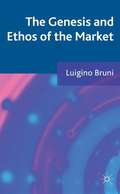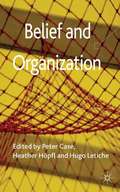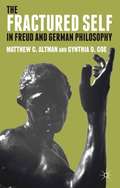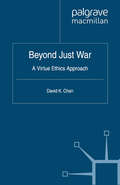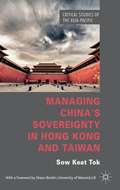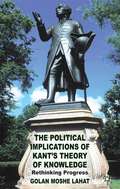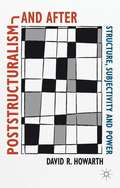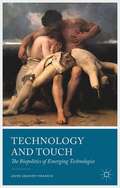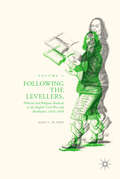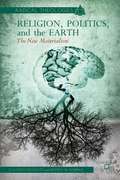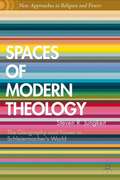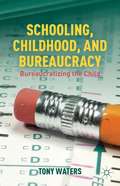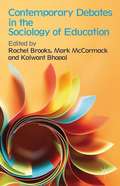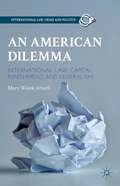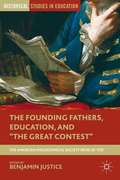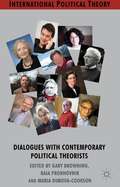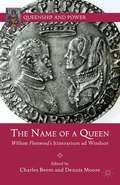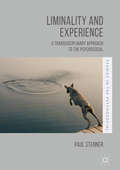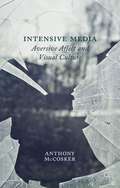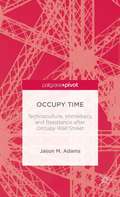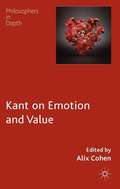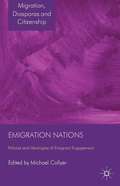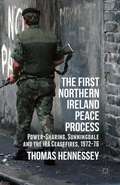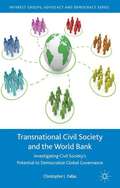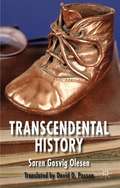- Table View
- List View
The Genesis and Ethos of the Market
by Luigino BruniA discussion of the anthropological roots of the market, tracing its development using the history of ideas and cultures as well as simple game theory. In his analysis of market ethics Bruni calls for a reconsideration of some of the central tenets of modern political economy, and the need for a new spirit of capitalism.
Belief and Organization
by Peter Case Hugo Letiche Heather HöpflExamines the alternative belief systems which contemporary organizational actors live by and through which they seek to find meaning within the dominant (neo)capitalist social order. This volume marks an attempt to move the study of belief forward within management and organization studies.
The Fractured Self in Freud and German Philosophy
by Matthew C. Altman Cynthia D. CoeSigmund Freud's psychoanalytic theory has deeply affected how we think of ourselves, in emphasizing the limits of consciousness and the impact of irrational forces on our behavior. Philosophers have begun to appreciate the significance of Freud's work, but they have not yet established Freud's place in the history of philosophy. The Fractured Self in Freud and German Philosophy argues that Freud addresses pivotal questions concerning the nature of subjectivity that occupy philosophers such as Kant, Hegel, Marx, and Nietzsche. Altman and Coe examine Freud's transformation of German philosophical approaches to freedom, history, and self-knowledge; defend a theory of situated knowledge and agency; and consider the relevance of Freudian thought for contemporary issues in critical race theory, science studies, and cultural studies. Through this interdisciplinary analysis, the book illuminates the productive tensions between Freud and nineteenth-century thought in ways that are relevant to philosophy, psychology, and intellectual history. "
Beyond Just War: A Virtue Ethics Approach
by David K. ChanUnlike most books on the ethics of war, this book rejects the 'just war' tradition, proposing a virtue ethics of war to take its place. Like torture, war cannot be justified. It answers the question: 'If war is a very great evil, would a leader with courage, justice, compassion, and all the other moral virtues ever choose to fight a war?'
Managing China's Sovereignty in Hong Kong and Taiwan
by Sow Keat TokIs China always defensive about its sovereignty issues? Does China see sovereignty essentially as 'absolute,' 'Victorian,' or 'Westphalian?' Sow Keat Tok suggests that Beijing has a more nuanced and flexible policy towards 'sovereignty' than previously assumed. By comparing China's changing policy towards Taiwan and Hong Kong, the author relates the role of previous conceptions of the world order in China's conception of modern 'sovereignty', thereby uncovers Beijing's deepest concern when dealing with its sovereignty issues.
The Political Implications of Kant’s Theory of Knowledge
by Golan Moshe LahatBased on an insightful and innovative reading of Kant's theory of knowledge, this book explores the political implications of Kant's philosophical writings on knowledge. It suggests that Kant offers a stable foundation for the reconsideration of the idea of progress as crucial in matters of political management at the outset of the 21st Century.
Poststructuralism and After
by David R. HowarthThis book articulates the key theoretical assumptions of poststructuralism, but also probes its limits, evaluates rival approaches and elaborates new concepts. Building on the work of Derrida, Foucault, Heidegger, Lacan, Laclau, L#65533;vi-Strauss, Marx, Saussure and Žižek, the book also provides a distinctive version of the poststructuralist project.
Technology and Touch
by Anne Cranny-FrancisTechnology and Touch addresses the development of a range of new touch technologies, both technologies that we reach out to touch (like iPhones and iPads) and technologies that touch us (such as new prosthetics, smart clothing and robots). Cranny-Francis explores how this development helps us to connect with and understand our world, and ourselves. This everyday practice, or biopolitics of touch, is exemplified in a range of art works that deploy touch and allow us to examine the nature of being and of meaning. Cranny-Francis also refers the biopolitics of touch to the study of new touch technologies, exploring their capacity to have us reflect on old fears and prejudices, as well as challenging our incorporation into technologies and networks that may be unethical or deeply compromised.
Following the Levellers, Volume One: Political and Religious Radicals in the English Civil War and Revolution, 1645–1649
by Gary S. De KreyThis book reinterprets the Leveller authorships of John Lilburne, Richard Overton and William Walwyn, and foregrounds the role of ordinary people in petitioning and protest during an era of civil war and revolution. The Levellers sought to restructure the state in 1647-49 around popular consent and liberty for conscience, especially in their Agreement of the People. Their following was not a ‘movement’ but largely a political response of the sects that had emerged in London’s rapidly growing peripheral neighbourhoods and in other localities in the 1640s. This study argues that the Levellers did not emerge as a separate political faction before October 1647, that they did not succeed in establishing extensive political organisation, and that the troop revolt of spring 1649 was not really a Leveller phenomenon. Addressing the contested interpretations of the Levellers throughout, this book also introduces Leveller history to non-specialist readers.
Religion, Politics, and the Earth
by Jeffrey W. Robbins Clayton Crockett"Following Vattimo's postmodern philosophy, Badiou's postmetaphysical ontology, and i ek's revolutionary style, the authors of this marvelous book invites us to reactivate our politics of resistance against our greatest enemy: corporate capitalism. The best solution to the ecological, energy, and financial crisis corporate capitalism has created, as Crockett Clayton and Jeffrey Robbins suggest, is a new theological materialism where Being is conceived as energy both subjectively and objectively. All my graduate students will have to read this book carefully if they want to become philosophers. " - Santiago Zabala, ICREA Research Professor at the University of Barcelona "This is a book of an extraordinary timeliness, written in an accessible and strikingly informative way. It is excellently poised to become a synthetic and agenda setting statement about the implications of a new materialism for the founding of a new radical theology, a new kind of spirituality. I consider this therefore quite a remarkable book which will be influential in ongoing discussions of psychoanalysis, continental philosophy, and theology. Moreover, it will be, quite simply, the best book about spirituality and the new materialism on the market today. While all of the work of the new materialists engage at one level or another the question of a new spirituality, I do not think there is anything comparable in significance to what Crockett and Robbins have provided here. " - Ward Blanton, University of Kent "This book will perhaps be most appreciated by the reader with an intuitive cast of mind, able to recognize the force of an argument in its imaginative suggestiveness . . . New Materialism is about energy transformation, we are told, energy which cannot be reduced to matter because it resonates with spirit and life . . . Yet the book strikes a fundamental note of hard reality: 'if we want our civilization to live on earth a little longer we will have to recognize our coexistence with and in earth'. " - Christian Ecology Link
Spaces of Modern Theology
by Graham Ward Steven R. JungkeitAs stories of borders, territorial disputes, and migration have escalated in recent years, so too space has emerged as a critical concept in theoretical literature. This book explores the imagination of space at the dawn of modern, liberal theology in the writings of Friedrich Schleiermacher. Schleiermacher wrote against the backdrop of expanding European colonialism and nationalism, providing a powerful ethics of space for a rapidly shrinking planet. Selectively appropriated, Schleiermacher's spaces of modern theology can be a valuable contribution to contemporary attempts to theorize the importance of space and place in human geographies.
Schooling, Childhood, and Bureaucracy
by Tony WatersIn exploring the relationship between bureaucratic schooling and the individual child, Waters describes the persistence of educational inequality, child development, and the nature of bureaucracy. The conclusions point out how education bureaucracies frame both schooling and childhood as they relentlessly seek to create ever more perfect children.
Contemporary Debates in the Sociology of Education
by Mark Mccormack Rachel Brooks Kalwant BhopalThe sociology of education is a vibrant discipline which has been responsible for a number of profound shifts in how we understand society. With innovations in the discipline sitting alongside more traditional lines of enquiry that continue to demand attention, this edited volume brings together some of the most prominent sociologists working in education today to address a wide range of empirical and theoretical issues. Adopting an international perspective, this book - now in paperback -foregrounds cutting-edge research that highlights both the diversity and complexity of understanding education in society. Contemporary Debates in the Sociology of Education not only showcases the real strengths of the discipline but, by bringing together original, empirical work by leading scholars, it advances our sociological understanding, acting as a source of stimulation and debate for postgraduate students and academics, as well as a touchstone for undergraduates seeking to engage with the discipline.
An American Dilemma
by Mary Welek AtwellAn American Dilemma examines the issue of capital punishment in the United States as it conflicts with the nation's obligations under the 1963 Vienna Convention on Consular Relations. In a number of high profile cases, foreign nationals have been executed after being denied their rights under the Vienna Convention. The International Court of Justice has ruled against the United States, but individual states have chosen to defy international law. The Supreme Court has not resolved the question of legal remedies for such breaches.
The Founding Fathers, Education, and "The Great Contest"
by Benjamin JusticeWinner of the 2014 Critics Choice Book Award of the American Educational Studies Association How did the Founding Fathers and their generation think about public education? One place to look is the same place they did: American Philosophical Society Contest of 1795. Sponsored by the nation's premier research organization, the contest challenged writers to imagine a system of mass, public education suited to the 'genius' of America. In this book, leading historians team together to unpack the mystery and significance of the contest: the essays it produced, the men who wrote and reviewed them, and the broader landscape of ideas about nationhood, race, gender, religion, higher education and social reform of the early American republic. The book also includes two chapters on historical research methods and, for the first time ever in print, all seven of the original essays.
Dialogues with Contemporary Political Theorists
by Gary Browning Raia Prokhovnik Maria Dimova-CooksonA lively and engaging collection which explains the various strands of political theory, identifies key futures trends and explores the foundations of contemporary debate. Features interviews with pre-eminent theorists, including Quentin Skinner, Carole Pateman and Alex Honneth.
The Name of a Queen
by Dennis Moore Charles BeemItinerarium ad Windsor concerns a central question of the Elizabethan era: Why should a woman be allowed to rule with the same powers as a king? The man who poses this controversial question within Itinerarium is none other than Queen Elizabeth's powerful favorite Robert Dudley, Earl of Leicester. On hand to provide answers are the statesman and poet Thomas Sackville, Lord Buckhurst, and William Fleetwood antiquary, Recorder of London, and dutiful chronicler of their 1575 conversation. This critical edition of Itinerarium reproduces Fleetwood's text with annotations and a host of interpretive and contextualizing essays from leading scholars. Taken together, they constitute the definitive introduction to this remarkable discussion of regnant queenship, providing a valuable tool for understanding contemporary notions of and underlying fears concerning the efficacy and desirability of female rule in Elizabethan England.
Liminality and Experience
by Paul StennerThis book breathes new life into the study of liminal experiences of transition and transformation, or ‘becoming’. It brings fresh insight into affect and emotion, dream and imagination, and fabulation and symbolism by tracing their relation to experiences of liminality. The author proposes a distinctive theory of the relationship between psychology and the social sciences with much to share with the arts. Its premise is that psychosocial existence is not made of ‘stuff’ like building blocks, but of happenings and events in which the many elements that compose our lives are temporarily drawn together. The social is not a thing but a flow of processes, and our personal subjectivity is part of that flow, ‘selves’ being tightly interwoven with ‘others’. But there are breaks and ruptures in the flow, and during these liminal occasions our experience unravels and is rewoven. This book puts such moments at the core of the psychosocial research agenda. Of transdisciplinary scope, it will appeal beyond psychosocial studies and social psychology to all scholars interested in the interface between experience and social (dis)order.
Intensive Media
by Anthony MccoskerThere is something unsettling, but also powerful, in the encounter with individual and collective experiences of human suffering. Intensive Media explores the discomfort and fascination initiated by instances of pain and suffering, their 'aversive affects', as they trouble but also vitalise contemporary media environments.
Occupy Time
by Jason M. AdamsWhile secondary texts on Paul Virilio typically see no way out of the tempo- and techno-dystopia he articulates, Occupy Time engages the events of Occupy Wall Street to fix attention on what such readings circumvent: Virilio's elusive theory of resistance.
Kant on Emotion and Value
by Alix CohenBy combining new cutting-edge essays and reprints by leading Kant scholars and Kantian philosophers, this volume offer the first comprehensive assessment of Kant's account of the emotions and their connection to value, whether in his philosophy of mind, ethics, aesthetics, religion and politics. Through a mixture of interpretation and critical discussion, the essays in this volume illuminate the various aspects of Kant's distinctive approach to the emotions and demonstrate its continuing relevance to philosophical debates. This collection will enrich current debates within Kantian scholarship as well as beyond, and will be of great interest to upper-level students and scholars of Kant, value theory, philosophy of emotion and aesthetics.
Emigration Nations
by Michael CollyerUntil very recently emigrants were considered an embarrassment, an irritation or an irrelevance by most states. The long experience of emigrant engagement in certain historical emigration countries, such as Italy, was very much the exception. Since about 2000, countries around the world have shown much greater enthusiasm for policies to encourage the loyalty of nationals who have made a permanent home elsewhere. These developments have changed the relationship between state institutions and emigrant nationals. Policies of emigrant engagement also challenge fundamental understandings about the nature of political society in the modern era; the notion of states as territorial institutions or the understanding of citizenship as membership in a territorially bounded polity are both undermined. This book provides copious evidence of this process, with detailed, comparable case studies of twelve countries and a new theoretical framework that helps explain changing policies towards emigrants.
The First Northern Ireland Peace Process: Power-Sharing, Sunningdale and the IRA Ceasefires 1972-76
by Thomas HennesseyThe First Northern Ireland Peace Process covers the various attempts to end the 'Troubles' from 1972-76. These attempts included secret talks with the Provisional IRA and a parallel process to build a political consensus between the British and Irish Governments and the main constitutional parties in Northern Ireland.
Transnational Civil Society and the World Bank
by Christopher L. PallasTransnational civil society is often seen as an important contributor to the democratization of global governance. In their engagement with the World Bank, however, transnational civil society organizations prioritize pre-existing mission over responsiveness to claimed stakeholders and undercut the authority of developing country governments.
Transcendental History
by Søren Gosvig OlesenTranscendental History defends the claim that historicality is the very condition for human knowledge. By explaining this thesis, and by tracing its development from Kant and Hegel to Derrida and Agamben, this book enriches our understanding of the history of philosophy and contributes to epistemology and the philosophy of history.
